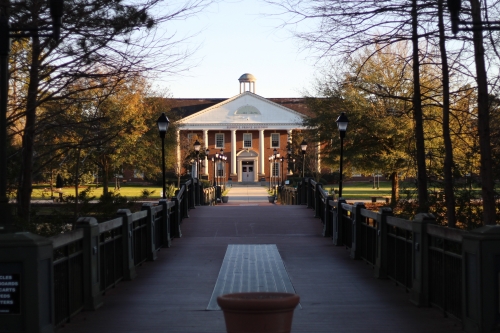Education Without Censorship: How the FORUM Act Could Shape SC Higher Ed
College students that attend school in South Carolina deserve to exchange ideas freely and to have their speech fiercely protected. South Carolina should aim to be a place where all students from all backgrounds may speak their minds without censorship. This vision may become a reality this legislation session with the FORUM Act.
Representative Bill Taylor (R – Aiken) has pre-filed H.3582, also known as the “FORUM Act” (Forming Open and Robust University Minds Act), which intends to protect free speech on college campuses. Previous legislation that has been introduced in South Carolina on this topic include H.4289, which passed in the House but not the Senate in 2024. PPI advocated for its adoption.
A few months ago, PPI Summer Fellow Charlotte Cross published a report on the free speech policies of the public colleges and universities in South Carolina. Top scoring schools in the state include Clemson University, Coastal Carolina University, College of Charleston, and University of South Carolina – Columbia. Categories to earn points in this report include harassment policies, policies on tolerance, respect, and civility, policies on “bias” and “hate speech”, bullying policies, protest and demonstration policies, posting policies, internet usage policies, policies restricting freedom of conscience, and security fee policies.
Charlotte’s report aimed to study whether universities’ policies backed up resolutions supporting the Chicago Statement. Adoption of the Chicago Statement has become more common amongst higher education institutions nationwide. The document has become a gold standard for free speech on college campuses. It focuses on three key principles to ensure students receive equal treatment.
- Commitment to free speech: Universities are required to allow all forms of speech as long as it does not violate the law, regardless of controversy. Students and faculty may openly debate and share perspectives without censorship.
- Open debate and inquiry: Universities are open spaces for debate, where conflicting viewpoints are allowed to compete. This encourages understanding through debate rather than suppression.
- No safe spaces: Universities cannot shield individuals from ideas or opinions because they disagree, feel unwelcome, or find offense. Instead, universities should embrace difficult topics and use them as opportunities to learn and grow.
By adopting the Chicago Statement, universities have made a pledge to protect free speech on their campuses. The FORUM Act aims to uphold the values that the Chicago Statement emphasizes, with the power of state law behind them. By signing it into law, public colleges and universities will be expected to protect all forms of lawful expression by students. Outdoor areas will be treated as public forums and will be open to all members of the campus’ community. The bill prevents universities from charging security fees based on a speech’s content. It also ensures political, religious, and ideological student organizations are not denied privileges due to their beliefs. It requires universities to report to the Commission on Higher Education annually, detailing any incidents in which free speech was violated and the actions taken to address them. Free expression policies must be available publicly, and students who feel their rights have been violated are permitted to sue.
In this upcoming legislative session, it is important to pass the FORUM Act in South Carolina. Ensuring all students and faculty receive protection over their free speech is top priority in our Palmetto Freedom Agenda for 2025-26.






